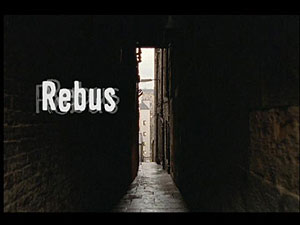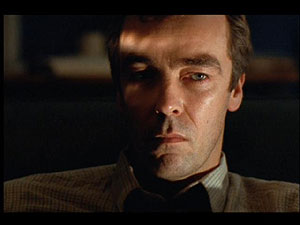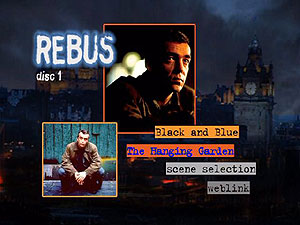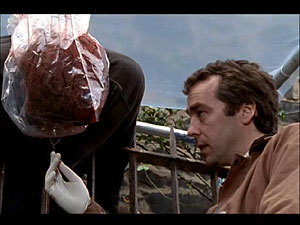| Reviews & Columns |
|
Reviews DVD TV on DVD Blu-ray 4K UHD International DVDs In Theaters Reviews by Studio Video Games Features Collector Series DVDs Easter Egg Database Interviews DVD Talk Radio Feature Articles Columns Anime Talk DVD Savant Horror DVDs The M.O.D. Squad Art House HD Talk Silent DVD
|
DVD Talk Forum |
|
|
| Resources |
|
DVD Price Search Customer Service #'s RCE Info Links |
|
Columns
|
|
|
Rebus
Four TV adaptations of the deeply flawed Scottish investigator's novels
 |
Loves: Detective stories, "C.S.I."
Likes: Flawed characters
Dislikes: Made-for-TV movies, most British dramas
Hates:
The Movies
As a big fan of detective mysteries like "C.S.I.", I've come to enjoy stories focused on what it takes to solve a crime, and the challenges the law faces in doing its job. These kinds of stories obviously depend on good, complex puzzles, but the personalities of the detectives are just as, or more important to the audience's enjoyment. "Rebus" features a character that, on paper, fits the mold, as Detective Investigator John Rebus (John Hannah) is a hard-drinking cop who hangs out with prostitutes and doesn't exactly follow the rules.
I've never read any of the Ian Rankin's novels these films are made from, so I can't attest as to the quality of the adaptations in these films, but they aren't bad as far as neo-film noir goes. Fans of shows like "C.S.I." and other American detective tales might get a bit bored by the very deliberate pacing or put-off by the Sam Spade-style narration, but if you can get past that and the heavy accents, the stories are pretty interesting. If you do enjoy the books, know that Rankin has said that Hannah doesn't fit the character quite right. You'll have to judge that for yourself, based on your own readings.
U.S. audiences will best know Hannah for his role as the comedic relief in the two The Mummy films, with Brendan Fraser. If that's the sole frame of reference for viewers, his character here will be a bit hard to swallow, as he's much more serious in these telefilms. In some ways, it's a similar switch to Hugh Laurie's move from "Black Adder" to "House, M.D." Unfortunately, Hannah doesn't make the transition quite as smoothly, and as a result, it's hard to get into his performance as a hard-boiled detective. Considering the fact that he's the lead, that hurts the films a bit, but not enough to make them unwatchable. In fact, they are pretty good, and Hannah's less-than-gritty persona actually works for the stories, as they make him vulnerable.
 Four Rebus films were made for television with Hannah in the lead (another actor, Ken Stott, has since taken on the role.) The first was "Black and Blue," which pit Rebus against a serial killer named The Disciple, who copied murders committed by The Preacher, a murderer Rebus had stopped years earlier. Things get complicated though when the previous case turns out to be less settled than Rebus thought, and The Preacher returns to school the student. This is the second best of the movies, thanks to the way The Preacher's story is told, but it's also the most pedestrian in terms of the visuals.
Four Rebus films were made for television with Hannah in the lead (another actor, Ken Stott, has since taken on the role.) The first was "Black and Blue," which pit Rebus against a serial killer named The Disciple, who copied murders committed by The Preacher, a murderer Rebus had stopped years earlier. Things get complicated though when the previous case turns out to be less settled than Rebus thought, and The Preacher returns to school the student. This is the second best of the movies, thanks to the way The Preacher's story is told, but it's also the most pedestrian in terms of the visuals.
Maurice Phillips, the director of several of the BBC's Dalziel and Pascoe films, took over with the second movie, "The Hanging Garden" and the look improved immediately. Told out of order, this story intertwines Rebus' private life, and that of his daughter, with a case involving a gang war, a Bosnian sex slave and a war criminal hiding in Scotland. Rebus' daughter Sammy gets hurt and his friend gets killed in the midst of it all, and it forces him to make a deal with the devil to get his revenge. Though the story gets lost in tangents, it winds its way to a decent conclusion.
Phillips returns to helm "Dead Souls," which centers around the suspected suicide of one of Rebus' cop friends. In investigating his death, Rebus finds out his pal may have been involved in a ring of child molesters who took advantage of abandoned children. The case busts open when a convicted pedophile with ties to the ring is discovered by his neighbors, forcing Rebus to protect him. No one seems to be who they are, as the case creates some uncomfortable questions that Rebus needs to find answers to. The twists and turns of this story can feel a bit unnecessary at times, but they do allow Rebus to question himself and what he believes in, which helps the character grow a bit.
The final Hannah film, "Mortal Causes" was made in 2001, but wasn't shown until 2004, because the terrorism and race crimes in the plot were considered too sensitive for the post-9/11 period. Truthfully, you'd have a hard time finding the parallels, but the movie is probably better for it. Instead of some Muslim extremists, the enemy is a Scottish white-power movement. It's certainly an ugly story, and one that gets a new shine since it's not your usual Germans or ugly Americans (well, with the exception of one.) The best part might just be the fact that some of Rebus' past dealings come back to haunt him as he tries to stop a menace that's bigger than he can handle. It's certainly not his troubles with the ladies, which are a meaningless distraction for such a serious storyline.
 The DVDs
The DVDs
The four films are spread oddly over three DVDs, which are packed in a double-width, three-tray keepcase. When I say they are spread oddly, it's because the four films are approximately 100 minutes each, with two films on the first disc while the final two get a disc each. If they could fit two films on the first disc, why not two on the second? Perhaps this set is a port of the UK version, which had three films on two discs, adding the fourth film on an additional disc.
The discs feature a static full-frame main menu, with a choice of playing the film and viewing scene selections. The scene-selection menus have still previews and titles for each chapter, while the DVDs have no audio options, no subtitles and no closed captioning.
The Quality
The films are presented in the less-than-desirable letterboxed full-frame format, and they are, for the most part, decent transfers. The films were made over a span of two years, and they are mostly the same as far as the visuals go. Dark scenes tend to be grainy, with a heap of video noise, though the noise can be evident in lighter scenes as well. The level of detail is good, and the color is good, though stronger hues like red can burn a bit hot, and skintones are a bit too red.
The sound on these DVDs will certainly not win any awards, presented in Dolby Digital 2.0, but coming across with a staid, non-dynamic feel. The show is nearly 100-percent dialogue, without much in terms of music or sound effects. Though very clean, which is hugely necessary for Americans trying to decipher the accents, there are some real negatives, as the sound drops out at times, most noticeably during the first and fourth films. Other than that, it's not half-bad.
The Extras
Aside from some weblinks, the only extra is a 24-minute making-of featurette, which is found on the third disc. Taken from the Scottish TV series "Artery," the piece is focused on the production of "Black and Blue," and has plenty of on-set footage, interviews with the cast and crew and even with Ian Rankin. It's a decent look behind the camera of the film.
 The Bottom Line
The Bottom Line
You've got to have some patience to enjoy these movies, because otherwise you're in for a long, slow night with D.I. Rebus. If you've got that Merchant Ivory/BBC/Masterpiece Theater-level ability to withstand a plot that moves at a glacier's pace, then these discs will provide a worthy way to spend nearly seven hours. The quality, though not nearly reference quality, doesn't distract much, and the one extra is a decent bonus if you do enjoy the films. Fans of the books, or similar titles in this genre, might want to go for a rental first, though there are many worse films you could end up with.
Francis Rizzo III is a native Long Islander, where he works in academia. In his spare time, he enjoys watching hockey, writing and spending time with his wife, daughter and puppy.Follow him on Twitter
*The Reviewer's Bias section is an attempt to help readers use the review to its best effect. By knowing where the reviewer's biases lie on the film's subject matter, one can read the review with the right mindset.
|
| Popular Reviews |
| Sponsored Links |
|
|
| Sponsored Links |
|
|
| Release List | Reviews | Shop | Newsletter | Forum | DVD Giveaways | Blu-Ray | Advertise |
|
Copyright 2024 DVDTalk.com All Rights Reserved. Legal Info, Privacy Policy, Terms of Use,
Manage Preferences,
Your Privacy Choices | |||||||














